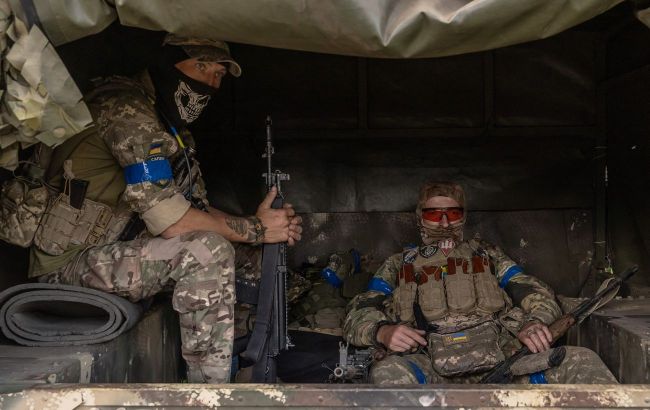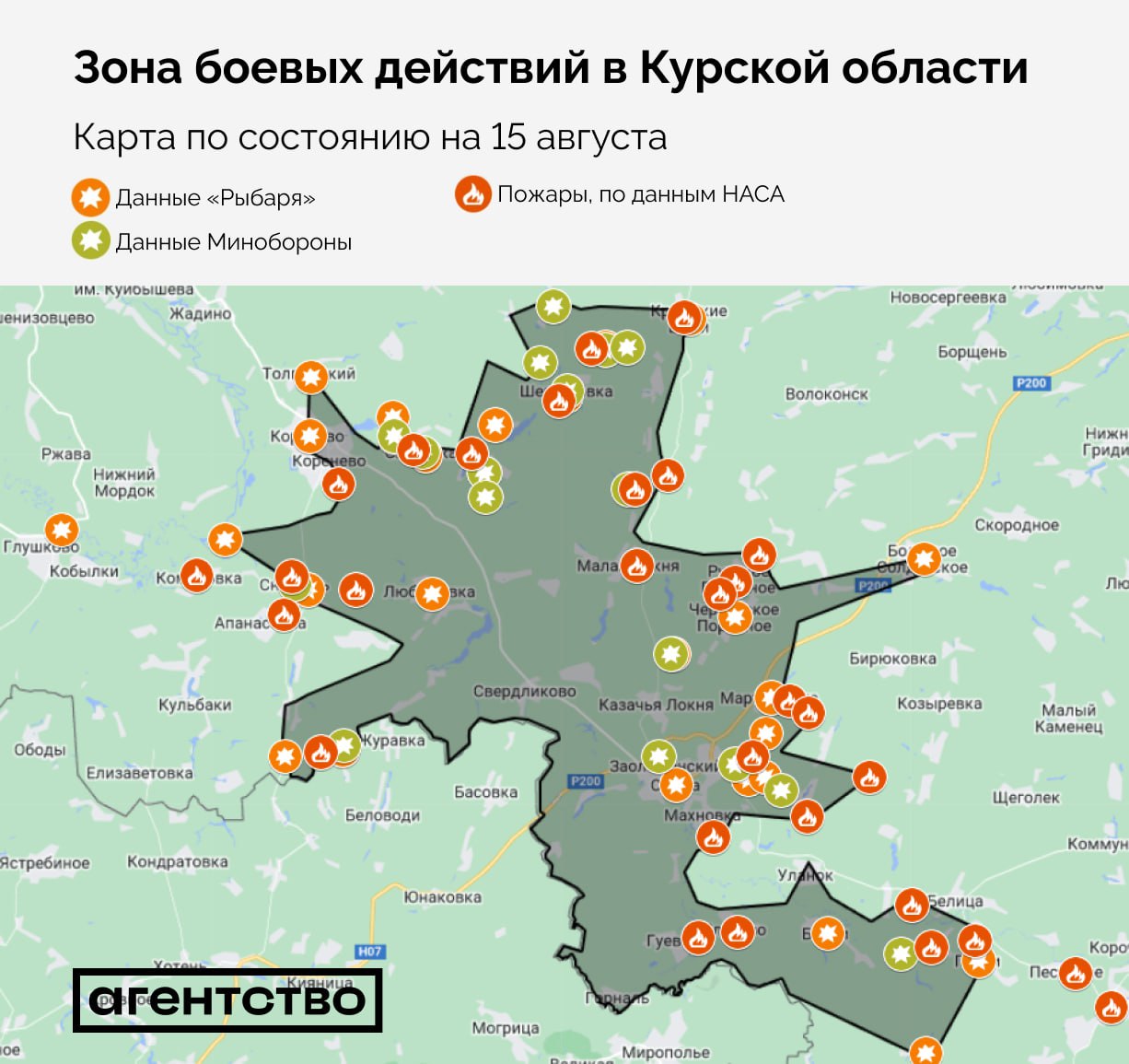'The situation could drag on.' Why Ukraine needs commandant’s office in Russian Kursk region
 Photo: Ukrainian soldiers on the border with the Kursk region (Getty Images)
Photo: Ukrainian soldiers on the border with the Kursk region (Getty Images)
Ukraine has established its first military commandant's office in the Kursk region of Russia as part of its offensive operation. It is led by General Eduard Moskalev and is based in Sudzha, which is under Ukrainian control.
For more details on why Ukraine has set up this military commandant's office in the Kursk region and how long the Ukrainian Armed Forces plan to stay, read the material by RBC-Ukraine.
Contents:
- Why did Ukraine establish a military commandant's office in the Kursk region
- What is known about the Commandant of Sudzha and his duties
- How long will the Ukrainian Armed Forces stay in the Kursk region
Why did Ukraine establish a military commandant's office in the Kursk region
The Ukrainian Armed Forces continue to expand their operational area in the Kursk region. There are reports of new settlements being taken under control.
According to estimates by the Russian media outlet Agency, the combat zone has increased by 10% since Monday, growing from approximately 1,050 to 1,150 square kilometers. This same figure was mentioned yesterday by the Commander-in-Chief of the Ukrainian Armed Forces, Oleksandr Syrskyi. He noted that since August 6, Ukrainian troops have advanced 35 kilometers deeper and taken control of 82 settlements.
Analysts from the Institute for the Study of War (ISW) suggest that not all the territory within the claimed advance is fully under control. The Ukrainian project DeepState marks 507.76 square kilometers as a "blue zone" (controlled) and nearly 641 square kilometers as a "gray zone." Combined, these figures closely match the official numbers.

Photo: a possible map of combat operations in the Kursk region (t.me/agentstvonews)
Reports indicate advancements towards the district center of Korenevo. According to Russian war bloggers, a large column has been destroyed there, similar to the earlier situation near Rylsk. There is no confirmation of this yet. However, photos of a Ukrainian Armed Forces soldier in the western part of Korenevo have already appeared in Ukrainian public media. Control over Korenevo would block the Russian route to Rylsk and cutting off Russian control over Rylsk would isolate several border checkpoints in the region.
The primary increase in the combat zone can be seen at the boundaries of the Sudzha, Belovsky, Korenevo, and Glushkovsky districts of the Kursk region. With the rising number of settlements, the issue of how to effectively control and protect thousands of civilians has arisen.
As Ombudsman Dmytro Lubinets mentioned, on August 14, during a meeting with President Volodymyr Zelenskyy, the establishment of military commandant's offices was discussed based on international law.
A military commandant's office is an organization that operates in a specific region and is responsible for wartime matters. Typically, its functions include interacting with local authorities, ensuring security at critical sites, and so forth.
Yesterday, Commander-in-Chief Syrskyi announced the creation of a military commandant's office to ensure order and address immediate civilian needs in the controlled part of the Kursk region. As Zelenskyy clarified, it is established in the "liberated town of Sudzha."
The key point is that the country controlling a certain territory of another state is responsible for everything that occurs there, explains expert and former spokesperson for the General Staff of the Ukrainian Armed Forces Vladyslav Seleznov.
"Therefore, it is clear that Ukraine, as a responsible member of the international community, creates a commandant's office in accordance with the Geneva Conventions. Its main task will be to meet the urgent needs of local residents," he explained to RBC-Ukraine.
According to him, the commandant's office's responsibilities include providing medications, basic sanitary and humanitarian supplies, water, food, and more.
"And, accordingly, it is necessary to protect people from enemy missiles, drones, shells, and mines, as active combat is ongoing. The issue of civilian safety and other non-combatants is very important. I think this is why the commandant's office is being established," the expert added.
According to international humanitarian law, Ukraine is responsible for managing the controlled territory of another state. This management is temporary (while control is exercised) and cannot be transferred to, for example, Russian opposition.
What is known about the Commandant of Sudzha and his duties
The military commandant of Sudzha in the Kursk region is Major General Eduard Moskalev. In a certain sense, he has made history as the first commandant representing Ukrainian authority on Russian territory.
Moskalev was born in 1973. In the mid-2000s, he graduated from the National Defense Academy. According to open sources, in 2012, he was the head of the 300th Training Tank Regiment of the 169th Training Center of the Ground Forces (Desna, Chernihiv region).
In September 2014, then-Colonel Moskalev was awarded the Order of Bohdan Khmelnytsky III Class for bravery and heroism in defending Ukraine's sovereignty and territorial integrity. This indicates that he participated in battles in Donbas from the early months of the hybrid Russian aggression.
He was promoted to the rank of Major General in August 2018. In March 2022, following the start of the full-scale Russian invasion, President Volodymyr Zelenskyy appointed the then-Commander of the Eastern Operational Command of the Armed Forces of Ukraine as Commander of the Joint Forces. In fact, at the same time, he became the head of the Ukrainian group of troops in the east of the country and received the Order of Bohdan Khmelnytsky, II class.
He was dismissed from the post of Commander of the Joint Forces in February 2023. After that, he headed the Odesa Operational and Strategic Group of Forces, the Donetsk Operational and Tactical Group, and then returned to Odesa.
It is unclear why Moskalev was specifically chosen as the commandant of Sudzha, according to BBC News Ukraine citing sources. It is noted that even in the General Staff, there are jokes that the choice might be related to his surname (moskal is an ethnic slur for Russians, used in Ukraine - ed.).
Vladyslav Seleznov agrees, that there is some irony in the fact that General Moskalev will become the "first Ukrainian commandant on Russian soil" in the Kursk region. However, according to Seleznov, the General will not be responsible for matters directly related to military operations.
"Military issues are handled by the Armed Forces of Ukraine, the forces and means conducting these operations. The role of the commandant is to ensure a safe environment for the residents of the controlled territory," Seleznov explained in a conversation with RBC-Ukraine.
How long will the Ukrainian Armed Forces stay in the Kursk region
The establishment of a military commandant's office in Sudzha and Ukraine's assumption of civilian security responsibilities indicate that the Armed Forces are not planning to withdraw quickly from the Kursk region. Another sign of the long-term presence of Ukrainian troops is the creation of engineering and fortification structures, notes Seleznov.
"Our forces are digging trenches, building bunkers, and mining dangerous areas. They are creating everything necessary for a prolonged defensive operation," the expert explained.
Predicting the duration of this operation is difficult. It depends on the resources available to both the Ukrainian army and Russian forces.
"It’s hard to make any predictions here. If the Russians bring in a large number of reserves and launch an offensive, we would have to transition to maneuverable defense. However, if they are unable to do so and we have sufficient resources, this situation could potentially drag on for a significant period. Not just for a month or two, but for much longer,” he said.
He added that there are too many uncertainties at the moment. Firstly, it is unclear what resources the Ukrainian forces are prepared to commit to maintaining and supporting the Kursk foothold. Secondly, it is uncertain what the Russian army is ready to do to eliminate it.
“So I don't think we should make any assumptions now," Seleznov concluded.
Sources: data on Ukrainian advances in the Kursk region, statements from President Volodymyr Zelenskyy, Commander-in-Chief Oleksandr Syrskyi, Ombudsman Dmytro Lubinets, and comments from military expert Vladyslav Seleznov.

